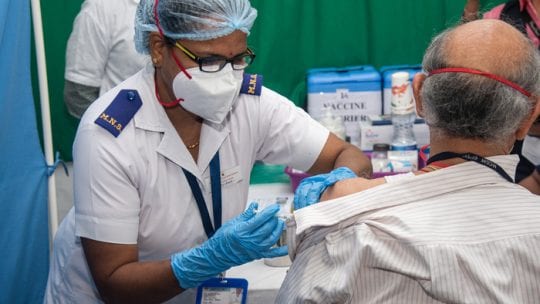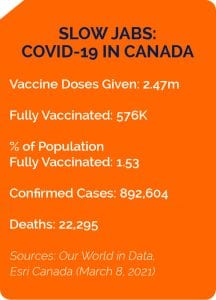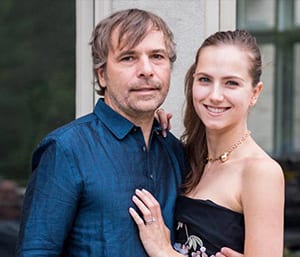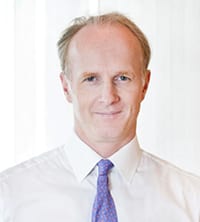
It’s become one of the first topics when speaking with friends, family or colleagues, ‘Did you get the vaccine yet?’
Now that several vaccines are available, doses are akin to consumer goods, albeit they could determine life or death. As such, some people don’t want to wait to get jabbed.
Since we’re in a global pandemic, demand for vaccination is ubiquitous. Moreover, countries are using different methods to determine who gets vaccinated.
In the US, for example, getting a vaccine appointment may depend on your age, health, profession, digital skillset, income and where you live.
On top of that, the question of vaccine reluctance–some Americans don’t trust vaccines–is a factor. And there’s a racial component: In the initial rollout, to healthcare workers, Black people “significantly” trailed whites in getting vaccinated, Kaiser Health News reports. What makes this more troubling, of course, is that Black, Hispanic and Native Americans are dying from the virus at rates nearly three times those of Whites, CDC reports.
A foundational question, of course, is whether or not your local health establishment has an ample supply of vaccine and people to administer it. The wait is longer in parts of states than others.
Canada’s Slow Rollout
 In Canada, the focus of this installment of Crisis Averted, vaccination began in mid-December. Yet just 1.5 percent of citizens are fully vaccinated (see chart).
In Canada, the focus of this installment of Crisis Averted, vaccination began in mid-December. Yet just 1.5 percent of citizens are fully vaccinated (see chart).
The government has made several promises, yet the public is wary, owing to a perception that the rollout still has issues and is among the world’s slowest.
Several recent polls track Canadians’ increasing anxiety over the slow rate of vaccination. Of 1,000 Canadians polled, just 48 percent were confident about the government’s latest promise to have most of the population vaccinated by September. In the US, President Biden has promised Americans will have access to vaccines in late May.
Delays and intense demand have resulted in a black market in both countries, as well as several forms of cutting the line.
Those with means in the US, for instance, are eschewing public vaccination and appealing to their concierge health providers.
In Canada, as well as elsewhere, people with means have employed creative methods.
Late in January, Rodney Baker, 55, a Canadian casino magnate, took his wife, Ekaterina, 32, and flew from Vancouver, heading north. The couple took two more flights, including a charter, to a remote part of Canada’s Yukon Territory, near the border with Alaska.
Put on your poker face
Once there, the couple donned different attire in an attempt to pass themselves off as employees at a local hotel. It almost worked.
The couple received a first dose of Moderna vaccine at a mobile clinic set up to vaccinate an isolated Yukon community of 100 people, including members of the White River First Nation.
Someone tipped off authorities, who later detained the Bakers as they waited for a flight out of the area.

After news of the incident made headlines, Mr. Baker resigned as CEO of the Great Canadian Gaming Corporation, which owns casinos and race tracks.
Ekaterina Baker, an actress, damaged her reputation, too. In an emotional March 2020 post to Instagram, during the initial days of the novel coronavirus outbreak, she’d urged young fans to remain home so they would not jeopardize the safety of older community members.
The Baker incident relates to the one we examine this month in that some people believe cutting the vaccine line is potentially a life and death concern. As White River first Nation chief Angela Demit said of the Bakers: “We are deeply concerned by the actions of individuals who put our elders and vulnerable people at risk to jump the line for selfish purposes.”
A Vaccine Vacation?
That brings us to this month’s incident. As we noted above, it’s also a Canada-related event. In addition, it involves a person of means attempting to skirt the vaccine line.
It’s the case of Mark Machin, who headed the Canada Pension Plan Investment Board (CPPIB) until Feb. 26, when he resigned.
The previous day, the Wall St Journal reported that Machin, 54, and his partner flew to the United Arab Emirates (UAE), where Machin received his first dose of the Pfizer vaccine. Machin planned to stay until he could get a second dose.
Canada has urged citizens to avoid overseas travel during the pandemic. It is not banned, though, the Journal reported.
Unlike Canada, the UAE is a vaccine success story, rapidly rolling out a Chinese-made product to residents.
Media reports paint a different portrait, however. Some describe the Emirates as a hotspot for vaccine destination-vacations, a luxury for the wealthy and well-connected. The Journal said there was no evidence that Machin, a British national, is a UAE resident, or that he broke the law while there.
A Non-Apology Apology
Another interesting aspect of the Machin case is the resignation announcement. It’s the paradigmatic non-apology apology.
The CPPIB in its statement notes leadership is “fundamental” in managing nearly $400 billion (US $) in assets for 20 million Canadian retirees.

Next, it slips in between much longer paragraphs that, “Recently, our CEO Mark Machin decided to travel personally to the United Arab Emirates where he arranged to be vaccinated against COVID-19. After discussions last evening with the Board, Mr. Machin tendered his resignation and it has been accepted.”
There is no other detail included in the statement about Machin’s trip to the Middle East. It sounds like a tame condemnation.
Machin’s record as an overseer of the fund, one of the largest pension funds in the world, was strong. Despite a slightly down year in 2020, Machin’s stewarship of the fund was not an issue.
Plenty of Praise
The subsequent paragraph praises Machin’s work and thanks him for his service.
“Mr. Machin has provided outstanding leadership to the organization as a senior executive and then CEO.”
Machin joined CPPIB in 2012. He was named CEO in 2016.
The statement continues: “The Board wishes to thank Mr. Machin for his global perspective, leadership and commitment to excellence and we offer him our sincere best wishes for the future. In his resignation, Mark emphasized his honour and pride in leading one of the finest global investment organizations over the last five years and deeply appreciates the tremendous diligence and talent of the entire CPP Investments team.”
A Retirement Memo or Apology?
Remaining paragraphs introduce the new leader, John Graham. More than a few heads turned at how quickly–a few hours–Graham was named.
In all, content directly related to Machin’s resignation numbers 39 words in the 395-word statement. Its tone sounds like a fond farewell for a valued employee heading to retirement. On the other hand, you could argue the CPPIB’s statement was attempting to ensure public confidence. Offering more detail might give the story longer legs.
That’s not how Ayme Zemke, EVP, Beehive Strategic Communication, viewed it.
“The statement feels tone deaf and does not do an effective job of demonstrating why Canadians should continue to put their trust and investments into the fund,” she says.
The CPPIB, Zemke adds, “missed a crucial opportunity to maintain customer trust.”
High Standard
People hold financial institutions and their leaders to high standards. When those aren’t met, trust is damaged, Zemke argues.
Instead of praising Machin’s leadership, CPPIB should have acknowledged Machin’s poor judgment and why it led to his departure, she says.
“More specifically, CPPIB could have focused on how this behavior is not in alignment with the organization’s stated Code of Conduct and Guiding Principles, one of which is integrity, and reinforced their commitment to both.”
Crisis Averted?
As we do each month, we ask crisis communicators if this crisis was averted. For Daniel Rene, managing director at kglobal in Washington, DC, there are several answers.
“It’s not really a crisis for [the CPPIB], but it is a reputation crisis for [Machin].” What can he do next and what are pressing questions should he want to continue his career? “He’ll need to carefully plan his next steps.”
As for the board’s statement, Rene agrees it’s a non-apology apology. In addition, “It sounds like the result of a heavily negotiated departure.”
The board, he says, elected not to kick Machin “when he was down,” instead praising his work and leadership. Still, it “covered its bases…[when] it acted quickly and decisively.” Indeed, Machin was gone within 24 hours of the story hitting the press.
What’s Next?
Since the public didn’t see Machin’s letter of resignation, Rene counsels that the former leader of Canada’s largest pension fund likely will need to make a full-throated apology before he can continue his high-powered career.
Machin will need to say he made his decision to get vaccinated overseas “in a moment of weakness,” Rene argues. Fortunately, at the moment, Rene says, people are “very forgiving,” provided your apology seems genuine.
A heartfelt apology might be an issue for Machin, though. In an internal memo sent to staff, Machin notes he’s upset that word of his “very private” trip reached the press and was the focus of “expected criticism,” Reuters reported.
AVOID ‘I’m Sorry if I Offended’
Be that as it may, Rene counsels Machin to avoid saying, ‘I’m sorry if I offended anyone.’ That type of language makes it sound as if you’re apologizing because you got caught, Rene adds.
Owing to the Bakers and another celebrity case in Canada, the apology’s tone is crucial.
Instead, assume you have offended, particularly the majority of Canadians who lack the means to fly to Dubai for inoculation, Rene says.
Machin earned $4.5 million in 2020, according to the CPPIB, an independent organization. Canada’s minister of finance selects its board of directors, though technically it is independent of government control.
In addition, there are people who feel Machin’s dose denied another, needier, person of the vaccine.
“Someone might have died because [Machin] took their vaccine [dose],” is how this group sees it, he says.
More advice for Machin: Make a donation to a fund that helps provide vaccine to those in need, Rene says.
